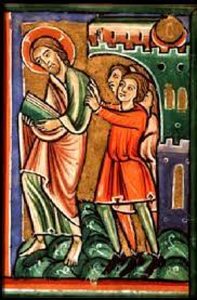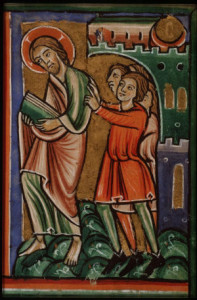Thoughts on Sunday’s Lessons for Jan. 30, 2022 (Epiphany 4C)
First Reading: Jeremiah 1:4-10
If not us, then who? If not now, when? We hear this familiar call to mission echoed through Sunday’s readings, beginning with Jeremiah, one of the great prophets of the Hebrew Bible.

Jesus ejected from the synagogue. Ancient French painting, Koninklijke Bibliotheek, The Hague. (Click image to enlarge.)
Jeremiah foresaw destruction and exile for Jerusalem because the people had forgotten their covenant to follow God’s way. But like most of the prophets, Jeremiah was not eager for his role. Jeremiah thought he was too young for such a chore. “I do not know how to speak, for I am only a boy,” Jeremiah said in response to God’s call. But God, reminding Jeremiah that God had consecrated him as a prophet before he was born, gave strength to Jeremiah’s spirit and sent him out with the words and the authority to warn his people.
Psalm: Psalm 71:1-6
The Psalmist sings in harmony with God’s message to Jeremiah: “Before I formed you in the womb I knew you.” In the Psalm, too, we sing gratitude to God who sustains us and who has been our strength since before we were born, since we were carried in our mother’s womb. We sing only the first seven of the entire Psalm’s 24 verses on Sunday, but the message of this Psalm is consistent throughout: God is our rock and refuge. We sing thanksgiving for God’s presence and protection. Our trust in God’s strength gives us hope.
Second Reading: 1 Corinthians 13:1-13
Now we hear Paul’s beloved celebration of love, a passage that the Book of Common Prayer suggests for use in weddings. Paul is not speaking of romantic love here, of course; the Greek word “agape” represents a gentle but powerful selfless love. Agape binds us all as worshipers in Christian community. Agape gives us the strength to carry out God’s work together. These words complete the readings that came before it in the previous two Sundays, in which Paul spoke of the way that God gives us all different gifts and calls us to different duties. We all work together like the parts of the body; each is important and all are necessary. Now we learn that love is the glue that holds the community together: Faith, hope and love abide, but love is the most important of all.
Gospel: Luke 4:21-30
Last Sunday we heard Jesus impressing his neighbors in the synagogue at Nazareth, declaring that he had come to fulfill Isaiah’s call to bring good news to the poor. Today, in Luke’s account, Jesus pushes them a little too far. First, he predicts that they will reject him because they knew him when he was a child: “No prophet is accepted in the prophet’s home town.” Then he indicates that his good news might be for all the poor, not just the poor who are our friends and neighbors and part of our community: He reminds them of two Hebrew Bible stories in which God’s grace was given to Gentiles. At this they rise up, drive him out of town and threaten to throw him off a cliff. But Jesus slips away from his captors and goes back to Capernaum in Galilee to continue his work.



